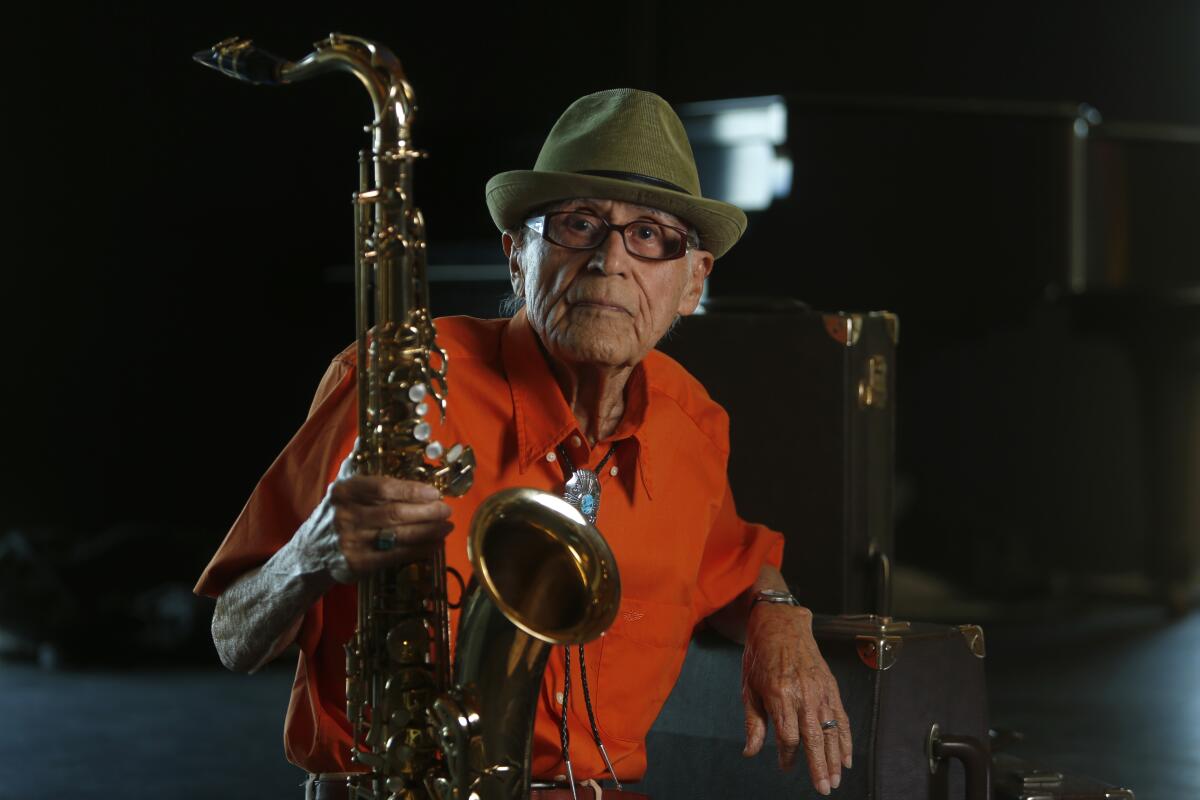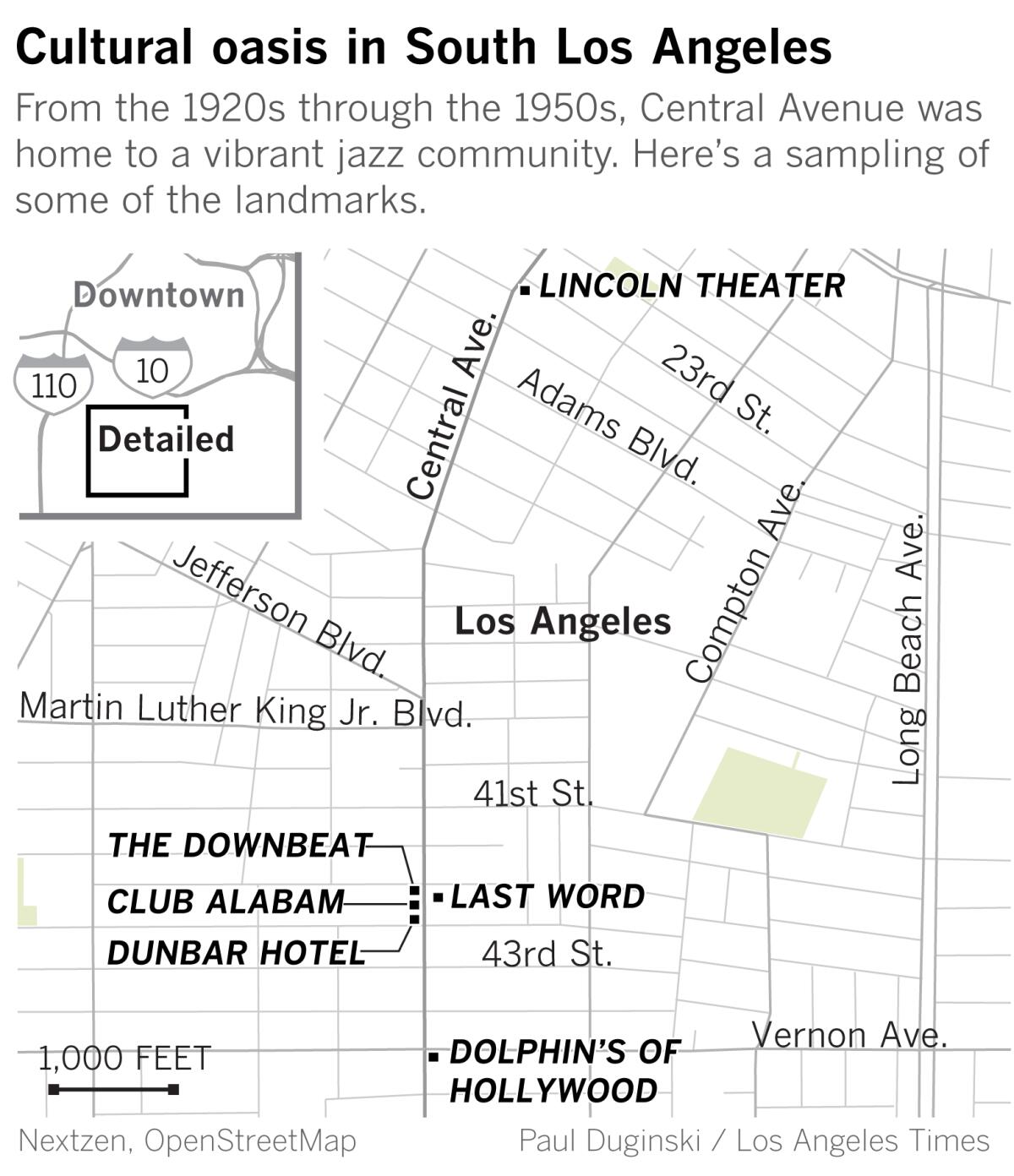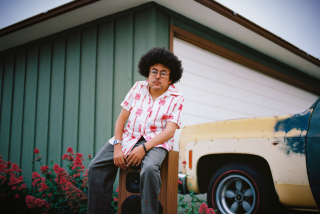Sax great Anthony Ortega dies at 94; from Sinatra to Zappa, he played with them all

Watts-born Anthony Ortega Watts-born Anthony Ortega was the subject of the 1994 book ‘Central Avenue Sounds: Anthony Ortega’ and 2007 documentary ‘The Street We Took.’
- Share via
Anthony Ortega did almost everything imaginable in a music career that stretched over 70 years that included leading a weekly Sunday jam session — into his mid-90s — until his health began to fail in August.
He collaborated with Frank Sinatra and Frank Zappa, Tony Bennett and Tony Orlando, Marvin Gaye and Quincy Jones. He performed on film soundtracks, including playing the bravura improvised sax solo in the Oscar-nominated “An Unmarried Woman” and was in the house bands for ABC’s “The Julie Andrews Show” and “The Redd Foxx Comedy Hour.” He also taught jazz master classes at universities in France and made cutting-edge albums that won international acclaim.
But there is at least one notable thing Ortega — who died of complications from pneumonia Sunday at a hospital in Encinitas at 94 — did not do, and it was by choice.
“In 1972, Dad had the opportunity to do a concert tour with Elvis Presley,” recalled Kathy Herington, one of Ortega’s three daughters. “But my brother was about to graduate from high school and Dad didn’t want to miss the ceremony.”
Kareem Abdul-Jabbar celebrates the cultural oasis that was Central Avenue in Los Angeles.
The tour went on without Ortega, who had appeared — playing sax at a street block party — in “Change of Habit,” a 1969 feature film that co-starred Presley and Mary Tyler Moore.
“When I was a kid, Dad used to take me with him sometimes when he was playing in Leighton Noble’s big band in the South Shore Room at Harrah’s Lake Tahoe,” recalled Antony Ortega Jr., a Los Angeles dentist.
“I got to watch Dad rehearse with Nat ‘King’ Cole and Barbra Streisand, and saw him perform with Jerry Lewis. Dad would play a flute solo and Jerry would pretend he was doing the solo. My dad loved to play music, and he couldn’t get enough of it, almost to the day he passed away.”
The devoted saxophonist’s final performance took place Aug. 21 at Mr. Peabody’s Bar & Grill in Encinitas, where — since 2011 — he had led a Sunday jam session nearly every week until his health began to falter late this summer. His only concession to age was to perform seated rather than standing.
Anthony Ortega only performs once a week.
“Tony was a master,” said Mark Dresser, a music professor at UC San Diego who played bass regularly with Ortega at San Diego jam sessions in the 1970s.
“He was a true improviser, both completely rooted in the tradition, essentially linear, and yet completely free in his playing,” Dresser said. “He had an expansive sound ... rhythmic vitality, and a willingness to dig into the sonic corners of where the music took him. He was remarkable.”
Anthony Robert Ortega was born June 7, 1928, in the Watts neighborhood of Los Angeles and began playing alto saxophone in ninth grade, followed by clarinet a year later. His sax teacher, Lloyd Reese, had also mentored such future jazz luminaries as Charles Mingus and Eric Dolphy.
“I was always inspired by music, from a very early age. And my whole dream was to play the sax,” Ortega said in a 2016 San Diego Union-Tribune interview.
After serving in the U.S. Army from 1948 to 1951, he joined vibraphone star Lionel Hampton’s big band. While on a tour of Europe with Hampton, Ortega met pianist/vibraphonist Mona Ørbeck in Oslo.
The couple, who became professional music collaborators, married and celebrated their 69th wedding anniversary this year. They moved to El Monte in 1954 and Hollywood two years later. They relocated to Lake Tahoe around 1960 and Azusa in 1965, before settling in Encinitas in northern San Diego County in 1975.
Ortega’s debut album, “The Anthony Ortega Quartet,” was released in 1954. His all-star 1961 album, “A Man and His Horns,” featured him double-tracking all of the multiple horn parts.
Ortega’s most recent album, “Afternoon in Paris,” was released in 2007 by the Swiss record label Hat Hut. He was the subject of the 1994 book, “Central Avenue Sounds: Anthony Ortega” and the 2007 film documentary, “The Street We Took.”
Yet, while jazz was his greatest musical passion, Ortega’s instrumental versatility enabled him to work with such diverse singers as Sinatra, Streisand and José Feliciano. Ortega’s big-band credits included ensembles led by Hampton, Gerald Clayton, Maynard Ferguson, Woody Herman and others. He also worked in smaller groups with Dizzy Gillespie, Chico Hamilton, Buddy Colette, Gigi Gryce and more.

Ortega performed on the soundtracks to an array of films, including “Gloria,” “The Pawnbroker” and “I, the Jury.” His TV credits included “The Lucy Show” and “The Bobby Darin Show.”
“When we were living in L.A., we would gather around the TV and watch Dad when he played on Julie Andrews’ show,” recalled Ortega’s daughter Kathy, who sang in the San Diego band the Fabulous Mar Dels from 1994 to 2008. “Dad got us her autograph and we were like: ‘Wow! That’s Mary Poppins!’ ”
For all his many credits with other musicians, it was as a solo artist, composer and band leader that Ortega shined brightest. The element of surprise was paramount in his playing, whether in a traditional or experimental context, or somewhere in between.
“I like to have a pleasant sound and make it pretty. However, in different instances, you get rougher and make it more like an exploration,” Ortega said in his 2016 Union-Tribune interview.
“The point is not to overdo any one particular thing — and to look at it as a story, or a value, within the composition that you are trying to get across,” he said.
Ortega’s daughter Kathy and son Tony Jr. both marvel at how devoted their father was to music, on stage and off, and to his family.
“He was always practicing at home, always improving,” Tony Jr. said. “I hope people will listen to his albums and — because he was so good — ask: ‘How come he wasn’t famous?’ But his dedication was to the music, not to trying to become a star.”
Ortega is survived by his wife, Mona; son Tony Jr. ; daughters Kathy Herrington, Lisa Ortega and Kim Backus; and four grandchildren; and one great-grandchild.
More to Read
Start your day right
Sign up for Essential California for the L.A. Times biggest news, features and recommendations in your inbox six days a week.
You may occasionally receive promotional content from the Los Angeles Times.








